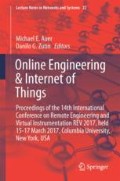Abstract
Remote laboratories in the educational context are made possible by the integration of the latest advances in telecommunication technology, software architectures and educational standards support. Remote laboratories are important in education because they provide access to equipment that some institutions cannot afford to purchase or maintain, reduce the need for dedicated physical space for equipment and personnel to staff laboratories. But more than just fill the absence of a real physical laboratory, remote laboratories can improve the users experience through the use of enhanced adaptive interfaces that, when complemented with the use of educational standards like Tin can API, can provide information important in the educational context, for example, the mastery level of the student and the complexity of the experiment. Based on that information, the remote laboratory could take actions related to the controls of the experiment, for example, disabling or enabling part of the experiment controls. Using smart adaptive interfaces, the experiments can gradually increase their complexity, taking into account variables that are clearly identified as part of the learning processes, such as: difficulty level of the topic, students’ knowledge, and course level among others.
This paper proposes a model and set of diagrams that define the integration of adaptive interfaces in remote laboratories for educational purposes.
Access this chapter
Tax calculation will be finalised at checkout
Purchases are for personal use only
References
EduApps Center. https://www.eduappcenter.com/: Learning Tools Interoperability (LTI) is a trademark of the IMS Global Learning Consortium, Inc. (www.imsglobal.org)
Orduna, P., Botero, S, Hock, N, Sancristobal, E., et al.: Generic integration of remote laboratories in learning and content management systems through federation protocols. http://morelab.deusto.es/media/publications/2013/conferencepaper/generic-integration-of-remote-laboratories-in-learning-and-content-management-systems-through-federation-protocols.pdf
IEEE Networked Smart Learning Objects for Online Laboratories Working Group. https://ieee-sa.imeetcentral.com/1876public/
Zapata Rivera, L.F., Larrondo Petrie, M.M.: Models of remote laboratories and collaborative roles for learning environments. In: Proceedings of the 13th International Conference on Remote Engineering and Virtual Instrumentation (REV 2016), Madrid, Spain, 24–26 February 2016. IEEE (2016). doi:10.1109/REV.2016.7444517
Zapata Rivera, L.F., Larrondo Petrie, M.M.: Models of collaborative remote laboratories and integration with learning environments. Int. J. Online Eng. 12(9), 14–21 (2016). International Association of Online Engineering, Austria
Villar-Zafra, A., Zarza-Sánchez, S., Lázaro-Villa, J.A., Fernández-Cantí, R.M.: Multiplatform virtual laboratory for engineering education. In: Proceedings of 9th International Conference on Remote Engineering and Virtual Instrumentation (REV 2012), Bilbao, Spain, 4–6 July 2012, pp. 1–6. IEEE. doi:10.1109/REV.2012.6293127
Rochadel, W., Bento da Silva, J., Shardosim Simão, J.P., da Costa Alves, G.R.: Educational application of remote experimentation for mobile devices. In: Proceedings of 10th International Conference on Remote Engineering and Virtual Instrumentation (REV 2013), Sydney, NSW, 6–8 February 2013, pp. 1–6 (2013). doi:10.1109/REV.2013.6502905
Bull, S., Kay, J.: Open learner models. In: Nkambou, R., Bourdeau, R., Mizoguchi, J. (eds.) Advances in Intelligent Tutoring Systems, pp. 301–322. Springer, Berlin (2010)
Saliah-Hassane, H., Dumont-Burnett, P., Christian Loizeau, C.: Design of a web-based virtual laboratory instrument measurement interface. In: Proceedings of 2001 International Conference on Engineering Education, Oslo/Bergen, Norway, 6–10 August 2001, p. 8D1.12-16 (2001)
Salzmann, C., Govaerts, S., Halimi, W., Gillet, W.: The smart device specification for remote labs. In: Proceedings of 12th International Conference on Remote Engineering and Virtual Instrumentation, (REV 2015), Bangkok, Thailand, IEEE, 25–27 February 2015, pp. 199–208 (2015). doi:10.1109/REV.2015.7087292
Author information
Authors and Affiliations
Corresponding author
Editor information
Editors and Affiliations
Rights and permissions
Copyright information
© 2018 Springer International Publishing AG
About this paper
Cite this paper
Zapata Rivera, L.F., Larrondo Petrie, M.M. (2018). Models and Smart Adaptive Interfaces for the Improvement of the Remote Laboratories User Experience in Education. In: Auer, M., Zutin, D. (eds) Online Engineering & Internet of Things. Lecture Notes in Networks and Systems, vol 22. Springer, Cham. https://doi.org/10.1007/978-3-319-64352-6_39
Download citation
DOI: https://doi.org/10.1007/978-3-319-64352-6_39
Published:
Publisher Name: Springer, Cham
Print ISBN: 978-3-319-64351-9
Online ISBN: 978-3-319-64352-6
eBook Packages: EngineeringEngineering (R0)

